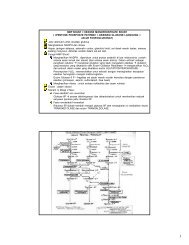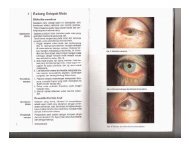International Handbook of Clinical Hypnosis - E-Lib FK UWKS
International Handbook of Clinical Hypnosis - E-Lib FK UWKS
International Handbook of Clinical Hypnosis - E-Lib FK UWKS
Create successful ePaper yourself
Turn your PDF publications into a flip-book with our unique Google optimized e-Paper software.
HYPNOSIS AND RECOVERED MEMORY 99<br />
by memory for nontraumatic events Kihlstrom, 1994, 1995); equally, memory<br />
should follow the same principles whether or not hypnosis is involved Kihlstrom<br />
& Barnhardt, 1993). Notably though, at a biological level, the release <strong>of</strong> neural<br />
hormones during trauma may enhance the consolidation and storage <strong>of</strong> memory for<br />
that event Cahill, Prins, Weber & McGaugh, 1994; but see Bremner, Krystal,<br />
Charney & Southwick, 1996). Also, the experience <strong>of</strong> trauma may be more likely<br />
to lead to the occurrence <strong>of</strong> recurrent and intrusive memories than to the forgetting<br />
<strong>of</strong> that experience Frankel, 1994; LeDoux, 1991; LeDoux, Romanski & Zagoraris,<br />
1989).<br />
Discussion about the recovery <strong>of</strong> memory for traumatic events typically shows<br />
various views about repression McConkey, 1997). In general, repression can be<br />
said to involve the motivated forgetting <strong>of</strong> information that is threatening to the<br />
self. Repression and related constructs such as dissociation, however, have been<br />
conceptualized in a variety <strong>of</strong> ways and that variation is one <strong>of</strong> the problems <strong>of</strong> the<br />
debate on recovered memory Bowers & Meichenbaum, 1984; Lynn & Rhue, 1994;<br />
Singer, 1990; Spiegel, 1994). Notably, analyses <strong>of</strong> the original concept <strong>of</strong> repression<br />
in the writings <strong>of</strong> Freud have highlighted its internal inconsistencies and its<br />
limited value beyond a very general description <strong>of</strong> assumed processes Holmes,<br />
1974, 1990; Macmillan, 1997; for a summary <strong>of</strong> empirical work, see Pope &<br />
Hudson, 1995). The relative impreciseness <strong>of</strong> the concept <strong>of</strong> repression and the<br />
dif®culty <strong>of</strong> testing it led Holmes 1990) to say that `despite over sixty years <strong>of</strong><br />
research ... there is no controlled laboratory evidence supporting the concept <strong>of</strong><br />
repression' p. 96). Further, he suggested that those who use the notion should<br />
warn that `the concept <strong>of</strong> repression has not been validated with experimental<br />
research and its use may be hazardous to the accurate interpretation <strong>of</strong> clinical<br />
behavior' Holmes, 1990, p. 97). Notwithstanding this view, clinical observation<br />
suggests that thoughts about and memories <strong>of</strong> important personal events can be set<br />
aside from normal awareness, and concepts such as repression or dissociation may<br />
be <strong>of</strong> heuristic value in helping to understand that process Bower, 1990; Davis,<br />
1990; Erdelyi, 1993; Nemiah, 1984; Weinberger, 1990). Although such concepts<br />
may have some value, this does not mean that if `repressed' or `dissociated'<br />
thoughts and memories are reported, then they are necessarily accurate representations.<br />
That is, accepting a notion <strong>of</strong> repression does not necessarily mean that<br />
recovered memories are historically accurate. Even if a memory has been forgotten<br />
for a time, this does not mean that it is not in¯uenced by the constructive and<br />
reconstructive features <strong>of</strong> memories in general Bowers & Farvolden, 1996).<br />
We should not assume that freshly reported material indicates the lifting <strong>of</strong><br />
repression that is linked to traumas <strong>of</strong> childhood. Rather, the fact that people<br />
sometimes remember events they had forgotten does not mean those events were<br />
traumatic, nor does it mean those particular memories were repressed. In other<br />
words, much <strong>of</strong> the nonreporting <strong>of</strong> such events may occur because <strong>of</strong> normal<br />
forgetting, embarrassment over reporting the events, the consequences <strong>of</strong> reporting<br />
the events, or various other reasons that relate to factors other than repression. In











![SISTEM SENSORY [Compatibility Mode].pdf](https://img.yumpu.com/20667975/1/190x245/sistem-sensory-compatibility-modepdf.jpg?quality=85)





